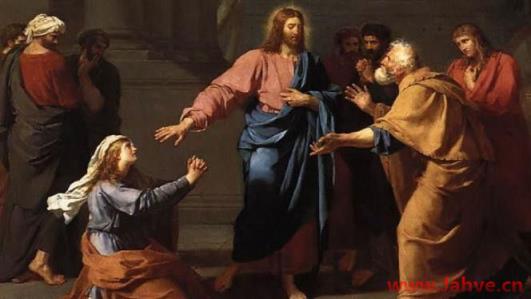 Bishop Barron翻译|Carrie2018-2-8
Bishop Barron翻译|Carrie2018-2-8 朋友们,今天的福音是耶稣和叙利腓尼基妇人的对话,这段故事在《圣经新约》中是最难解的篇章之一。这个可怜的客纳罕妇人作为外邦人走出来告诉耶稣她的女儿附了邪魔,主不理她。当她坚持要求,耶稣说:“我被派遣,只是为了以色列家失迷的羊。”当她跪倒在耶稣脚前,耶稣说:“拿儿女的饼扔给小狗是不对的。”当然,这个妇人以《圣经》中最出色的妙语之一(其他的妙语几乎都出自耶稣之口)回答:“主,是啊!可是小狗在桌子底下,也可吃到孩子们的碎屑呢!”话已至此,耶稣赞扬她的信德,并治愈了她的女儿。这个故事既有趣又令人兴奋。这个叙利腓尼基妇人受邀参与信徒生活、追随耶稣。耶稣起初的拒绝并不是因为祂心情不佳,而是因为祂想彰显妇人的信德。Friends, our Gospel for today, the story of Jesus’ conversation with the Syro-Phoenician woman, is one of those famously problematic passages in the New Testament. This poor woman, a Canaanite, a foreigner, comes forward and tells Jesus of her daughter who is troubled by a demon, and the Lord just ignores her. When she persists, Jesus says, "I have come only to the lost sheep of the house of Israel." When she prostrates herself at his feet, Jesus says, "It is not right to take the food of the children and throw it to the dogs."Of course, the woman responds with one of the best one-liners in the Scriptures, almost all of which otherwise belong to Jesus himself: "Please, Lord, for even the dogs eat the scraps that fall from the table of their masters." At this point, Jesus praises her for her faith and cures her daughter.What’s going on here is really interesting and provocative. The Syro-Phoenician woman is being invited into a life of discipleship, into the following of Jesus. She is resisted, not because Jesus is having a bad day, but because he wants the strength of her faith to show itself.
朋友们,今天的福音是耶稣和叙利腓尼基妇人的对话,这段故事在《圣经新约》中是最难解的篇章之一。这个可怜的客纳罕妇人作为外邦人走出来告诉耶稣她的女儿附了邪魔,主不理她。当她坚持要求,耶稣说:“我被派遣,只是为了以色列家失迷的羊。”当她跪倒在耶稣脚前,耶稣说:“拿儿女的饼扔给小狗是不对的。”当然,这个妇人以《圣经》中最出色的妙语之一(其他的妙语几乎都出自耶稣之口)回答:“主,是啊!可是小狗在桌子底下,也可吃到孩子们的碎屑呢!”话已至此,耶稣赞扬她的信德,并治愈了她的女儿。这个故事既有趣又令人兴奋。这个叙利腓尼基妇人受邀参与信徒生活、追随耶稣。耶稣起初的拒绝并不是因为祂心情不佳,而是因为祂想彰显妇人的信德。Friends, our Gospel for today, the story of Jesus’ conversation with the Syro-Phoenician woman, is one of those famously problematic passages in the New Testament. This poor woman, a Canaanite, a foreigner, comes forward and tells Jesus of her daughter who is troubled by a demon, and the Lord just ignores her. When she persists, Jesus says, "I have come only to the lost sheep of the house of Israel." When she prostrates herself at his feet, Jesus says, "It is not right to take the food of the children and throw it to the dogs."Of course, the woman responds with one of the best one-liners in the Scriptures, almost all of which otherwise belong to Jesus himself: "Please, Lord, for even the dogs eat the scraps that fall from the table of their masters." At this point, Jesus praises her for her faith and cures her daughter.What’s going on here is really interesting and provocative. The Syro-Phoenician woman is being invited into a life of discipleship, into the following of Jesus. She is resisted, not because Jesus is having a bad day, but because he wants the strength of her faith to show itself.

微信小程序
微信扫一扫体验

微信公众账号
微信扫一扫加关注
顶部
